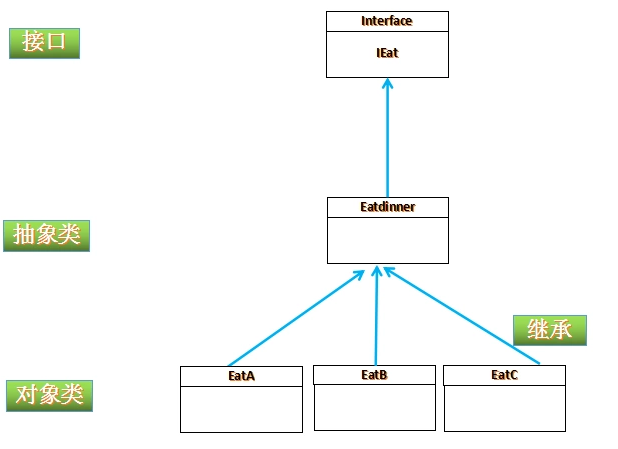模版设计模式之js代码实现
模版设计模式
设计模式处处透漏者前辈们的指挥, 在众多设计模式中模版设计模式是软件设计中最常用, 最正统的模式, 也是本人最喜欢的模式, 其就像一颗颗螺丝钉处处体现在软件设计和其他模式中父类定义一个模板结构,将部分具体内容延迟到子类去实现
在软件系统设计中最常用的就是 接口--抽象类--类 三级设计模式, 如下图
模版设计模式结构
再此模式中接口定义了方法, 抽象类定义了算法的框架实现了一部分算法, 对象类则实现了剩余的其他方法(当然如有需要可以灵活配置, 比如抽象类实现了一个默认的方法, 如有需要对象类可以重写这个方法)
实现
-
接口
let IEat = new Interface('IEat', ['eatDinner','buy','cook', 'eat']) -
抽象类
let Eatdinner = function () { }; Eatdinner.prototype.buy = function () { throw new Error(); }; Eatdinner.prototype.cook = function () { throw new Error(); }; Eatdinner.prototype.eat = function () { console.log('吃'); }; Eatdinner.prototype.eatDinner = function () { this.buy(); this.cook(); this.eat(); }; -
对象类
let EatA = function () { Eatdinner.call(this); } extend(EatA, Eatdinner); EatA.prototype.buy = function () { console.log('萝卜'); } EatA.prototype.cook = function () { console.log('炒'); } let EatB = function () { Eatdinner.call(this); } extend(EatB, Eatdinner); EatB.prototype.buy = function () { console.log('萝卜'); } EatB.prototype.cook = function () { console.log('炸'); } let EatC = function () { Eatdinner.call(this); } extend(EatC, Eatdinner); EatC.prototype.buy = function () { console.log('青菜'); } EatC.prototype.cook = function () { console.log('烤'); }
模板模式的优点
- 具体细节步骤实现定义在子类中,子类定义详细处理算法是不会改变算法整体结构。
- 代码复用的基本技术,在数据库设计中尤为重要。
- 存在一种反向的控制结构,通过一个父类调用其子类的操作,通过子类对父类进行扩展增加新的行为,符合“开闭原则”。


 浙公网安备 33010602011771号
浙公网安备 33010602011771号